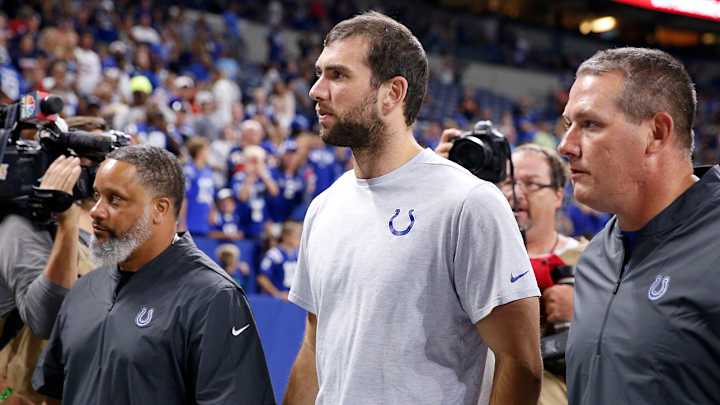Andrew Luck and the Path to Walk Away

This story appears in the Sept. 9, 2019, issue of Sports Illustrated. For more great storytelling and in-depth analysis, subscribe to the magazine—and get up to 94% off the cover price. Click here for more.
Which quote best sums up Andrew Luck’s retirement decision to you?
Option 1: “I just honestly want to do what’s best for my health. From what I’ve researched and what I’ve experienced, I don’t think it’s worth the risk.”
Option 2: “I no longer wish to put my body at risk for the sake of entertainment. I think about the rest of my life, and I want to live it with much quality.”
Option 3: “There is no reason to be playing football or supporting football right now. I can think of more reasons not to support it than to actually support it.”
Pick whichever one you want, but understand: None of those came from Luck. The first was rising star 49ers linebacker Chris Borland to ESPN, when he retired in 2015, after his rookie year. The second was former Steelers running back Rashard Mendenhall, when he retired, in 2014, at age 26. And the third was former Lions linebacker DeAndre Levy to the Detroit Free Press in 2018, a year after he retired at 29.

When the 29-year-old Luck retired, he did not start a trend; he joined one. Today’s NFL player spends his entire career haunted by the specter of head trauma’s long-term effects and a post-retirement life of physical pain. Most of them don’t want to be like Andrew Luck and retire when they still have seasons’ worth of games to play and millions of dollars to make. But they also don’t want to end up like Mike Webster, Junior Seau or Dave Duerson—three of the many former NFL stars who were ultimately broken by the game.
Privately, a lot of players wonder if football is worth it. But they are wary of saying it publicly. They fear being derided as soft by fellow players, or as spoiled millionaires by their otherwise adoring fans.
Of course, Luck’s retirement won’t result in fellow players quitting en masse. Players who walk away early tend to be those who know they have someplace to go. Robert Smith, who retired in 2001 shortly after running for 1,521 yards at age 28, had planned to go to medical school before settling into a career as a college football analyst and a life of, among other things, amateur astronomy. Borland and Luck were both wise, curious and comfortable with themselves at a young age.
More players share the outlook of Tom Brady, Peyton Manning and Ed Reed: They want to play until they no longer can. As much as the game takes from them, they fear life without it. Making it to the NFL takes such an intense commitment that it is understandably difficult for players to stop committing to it. Part of the game’s ethos is that you play through pain. Most players accept that implicitly and play until the league won’t employ them anymore.
But for those who do want to retire, Luck’s announcement may be inspirational—not so much because of the decision itself, but because of the reaction to it. Most NFL players seemed to applaud Luck. His fellow Colts praised him—and criticized Indianapolis fans for booing him when the news broke. “There are a lot of players who feel this way,” Chester Rogers, one of his receivers, told Sports Illustrated. “Players on different teams have expressed that to me. Man, I actually feel the same way Andrew feels. I’m waking up in pain every single day, taking all this kind of pain medicine and fighting every day just to practice.”
J.J. Watt—arguably the most physically dominant player of his generation—said Luck’s decision “takes an immense amount of courage.” It would be hard to imagine, say, Lawrence Taylor making that comment about a player who retired in the 1980s.
No football player wants to be called soft. When NFL stars compliment Luck for his decision, they inadvertently send a signal to their fellow players: You don’t have to stick around; we understand. We can reasonably expect more players to do what Luck did, because they know more players will react as Watt did. The roster of players who retired early because of long-term health concerns is still not that large in a league of 2,000 players. But it is growing every year.
• Question or comment? Email us at talkback@themmqb.com.
